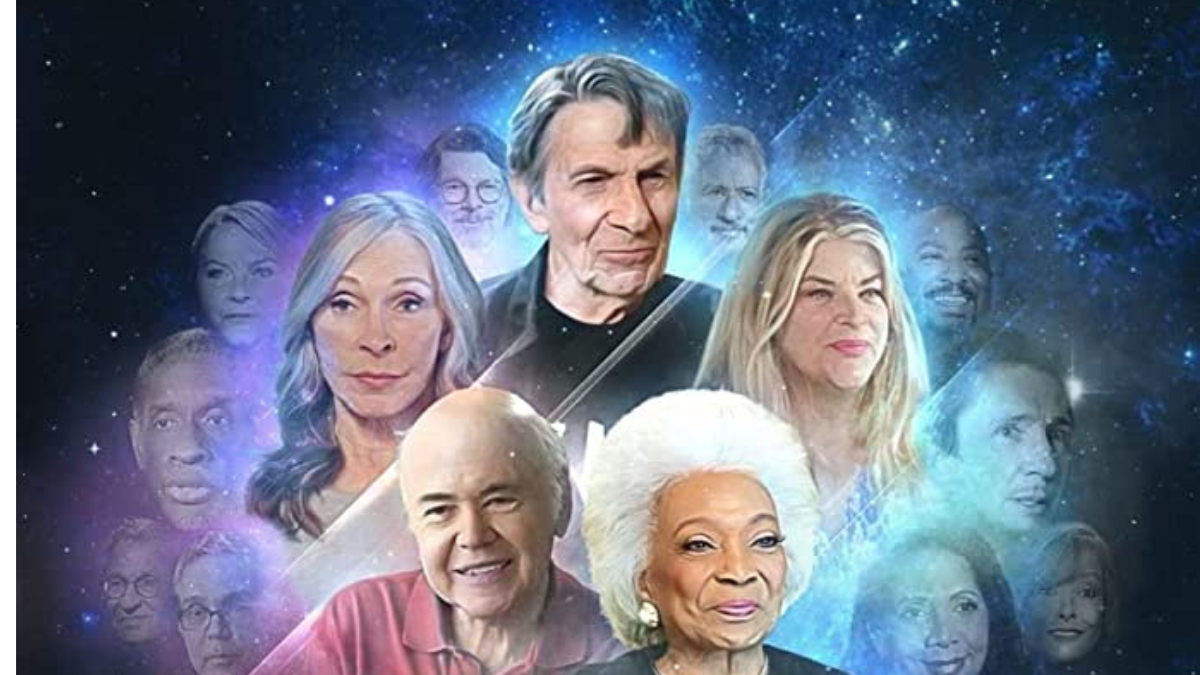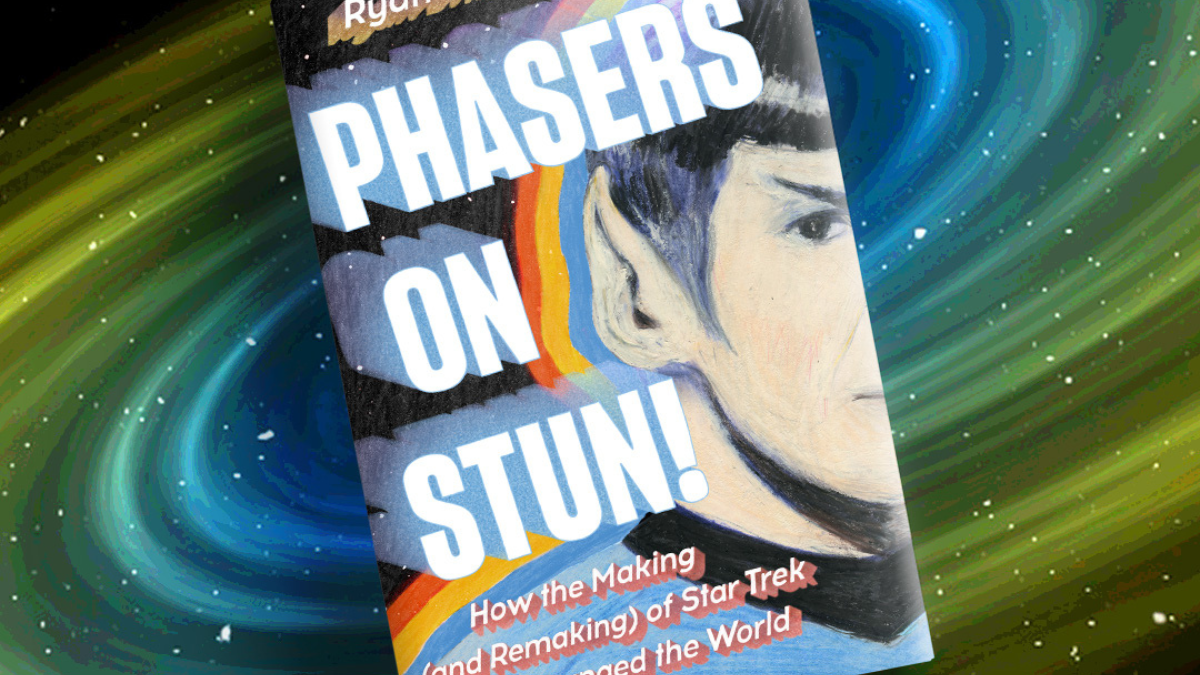REVIEW & CONTEST: Does 'The Center Seat' Make a Good Companion?

Cover of THE CENTER SEAT: 55 YEARS OF TREK. Image: The Nacelle Company.
APRIL 24, 2023 - In 2021 the Nacelle Company, who brought us the Netflix documentary series The Toys That Made Us and are currently producing the podcast Gates McFadden InvestiGates: Who Do You Think You Are? produced a 10-episode documentary entitled The Center Seat: 55 Years of Star Trek. Last month they published the companion book to that series, an oral history, and I got my hands on it. Make sure to read all the way to the end of this review if you’d like to win a copy of your own.
The Hand-Feel
I’m a sucker for physical books. I’ll read books on my iPad in a pinch, but there’s nothing like holding a physical book in your hands and flipping through its pages. People talk about the mouth-feel, the physical sensations produced by consuming food and drink. Well, I call this the hand-feel, and The Center Seat gets a 10/10 for it.
It’s a beautifully produced hardcover volume that fits nicely in your hands, not too big or heavy to comfortably hold and page through. The cover itself has a beautifully rendered design showcasing many of the interviewees who are featured within. The pages’ weight is just right, too, making for a satisfying experience.
These things may seem trivial, but for a bibliophile, they make a difference. While not more important than what lies inside, they give you your first impression and a good design can make you excited to read the book as much as a bad design can put you off. Suffice it to say, I found the design enticing. It spoke of a carefully put-together volume that I couldn’t wait to dig into. As it happens, this first impression was both accurate and misleading.
Geting the. Detailss Rihgt
The Center Seat might be the worst-edited book I’ve ever read. I get annoyed when a book I’m reading has a period out of place or a word misspelled, but I understand that mistakes happen. But the high production value this book’s exterior shows off is belied by the poor editing. I have no doubt that the interviews were put through some kind of speech-to-text editor and then given only the lightest of checks.
The book opens with a Table of Contents, listing every one of the 9 chapters, which would be terrific, except for one thing. In the Star Trek: The Original Series episode “The Ultimate Computer” the M-5 is given command of the Enterprise and Captain Kirk is referred to as a “dunsel,” a 23rd-century term describing a part with no useful purpose. Lacking a list of page numbers, the Table of Contents is this book’s dunsel. Except by episode’s end, Kirk has proved his usefulness, while I’m still waiting for the Table of Contents to make its case.
Moving on, there are words misspelled and missing and incorrect punctuation throughout. Now, this is an oral history, and I understand that people often speak in run-on sentences. It’s the editor’s job to decide where to put the comma or the period to make the text readable. Especially in the earlier half of the book, I found myself frequently thinking, “There should be a comma there” or “That period is three words too early.”
I’ve used speech-to-text software and recognize the kinds of mistakes they make, which is why, when I use one to write up interviews, I thoroughly read every word and edit it to my satisfaction. Somebody may disagree with my choices in that area, which is fair enough, but many of these errors were simply bad grammar.
And worse, many of the names were wrong. I took a list of the most egregious offenders, which I headed “Mistaken Identity”:
Sirena Jones (instead of Cyrano)
Garek (instead of Garak)
Cassidy Yates (instead of Kasidy)
Vicon (instead of Vulcan)
I will admit that two of these, (Garek and Vicon) were only used once each and that this complaint is more than a little nitpicky. But seriously, when you look up the word “nitpick” in a dictionary, you find a picture of a Star Trek fan.
I often find names that I’m not sure how to spell or properties with which I am unfamiliar. In those instances, I always do my research. I don’t always get it right, but 9.9 times out of 10 you can find the correct spelling of a person’s name via a Google search. With a name that could potentially have more than one spelling like Kasidy, I would have looked it up. In fact, I did that while I was writing this review, just to be sure.
The effect is to make the book seem like it was slapped together in a hurry without thought or care. Which is too bad, because while it is my only criticism of the book, it’s a pretty darn big one, as far as I’m concerned, and affected my enjoyment of the book.
Nitpick or nit-pick
[ nit-pik ]
verb (used without object)
1. to be excessively concerned with or critical of inconsequential details.
verb (used with object)
2. to criticize by focusing on inconsequential details.
noun
3 a carping, petty criticism.
adjective
4. Also nit·pick·y . of, relating to, or characteristic of a person who nitpicks: a nitpick review of the miniseries.
A Good Companion
It is not my intention to lambast this book, far from it. I loved the docuseries and I want this companion volume to succeed. And poor editing aside, it does. It’s not the first oral history of the Star Trek universe to be published. For that, you have to turn to Edward Gross and Mark A. Altman’s enormous 2-volume The Fifty-Year Mission: The Complete, Uncensored, Unauthorized Oral History of Star Trek (2016).
This volume is much slimmer than those, but apparently more authorized. And even though The Center Seat’s 370-page length doesn’t even come close to its predecessor’s 1,440 pages, it still feels like it contains the entire history of Trek from creator Gene Roddenberry’s original vision all the way through the finale of Star Trek: Enterprise, which signaled the end of the Rick Berman era.
I’m a sucker for behind-the-scenes stories, and this one’s chock full of them, from the well-known (Star Trek owes its existence to Lucille Ball) to the lesser-known (Graham Greene was a finalist to play Chakotay in Star Trek: Voyager, a role that ultimately went to Robert Beltran.) I never get tired of hearing these stories, and the interviews in this book, which were taken from the docuseries are a fun read for anyone who loves Trek history. This wouldn’t be a companion book if they gave you everything that the series had, but that works in reverse, too. Many of the interviews transcripted into the book are expanded from what you see and hear onscreen, adding an additional level of insight to the secrets revealed.
Peter Holmstrom’s interstitial narration, appearing throughout, provides necessary background information and ties the interviews together in an entertaining style and occasionally humorous commentary. Holmstrom, a former student of one of Trek’s earliest writers, Dorothy Fontana, handles it with a deft hand, proving his knowledge of the franchise and his mastery of the pen. Or rather, the keyboard.
In general, I really liked the book, but if I hadn’t been reading it for this review, the poor editing would have made me put it down halfway through chapter 2 and never pick it up again. Which is a shame, because in all other respects, it is a stellar read. In the words of LeVar Burton, though, “You don’t have to take my word for it….”
Giveaway Time
…because we have two copies of the book to give away. The rules are simple:
Follow @dailytreknews on Twitter.
Post this review, tagging @dailystartreknews and @nacellecompany and #thecenterseat.
The contest is open through May 5, 2023 at 11:59pm EST. A drawing will be held on or about May 6 and the two winners will be notified shortly thereafter. Good luck!
T is the Managing Editor for Daily Star Trek News and a contributing writer for Sherlock Holmes Magazine and a Shakespeare nerd. He may have been the last professional Stage Manager to work with Leonard Nimoy, has worked Off-Broadway and regionally, and is the union Stage Manager for Legacy Theatre, where he is currently working with Julie Andrews. after which he’ll be working on Richard III at Elm Shakespeare Company.






